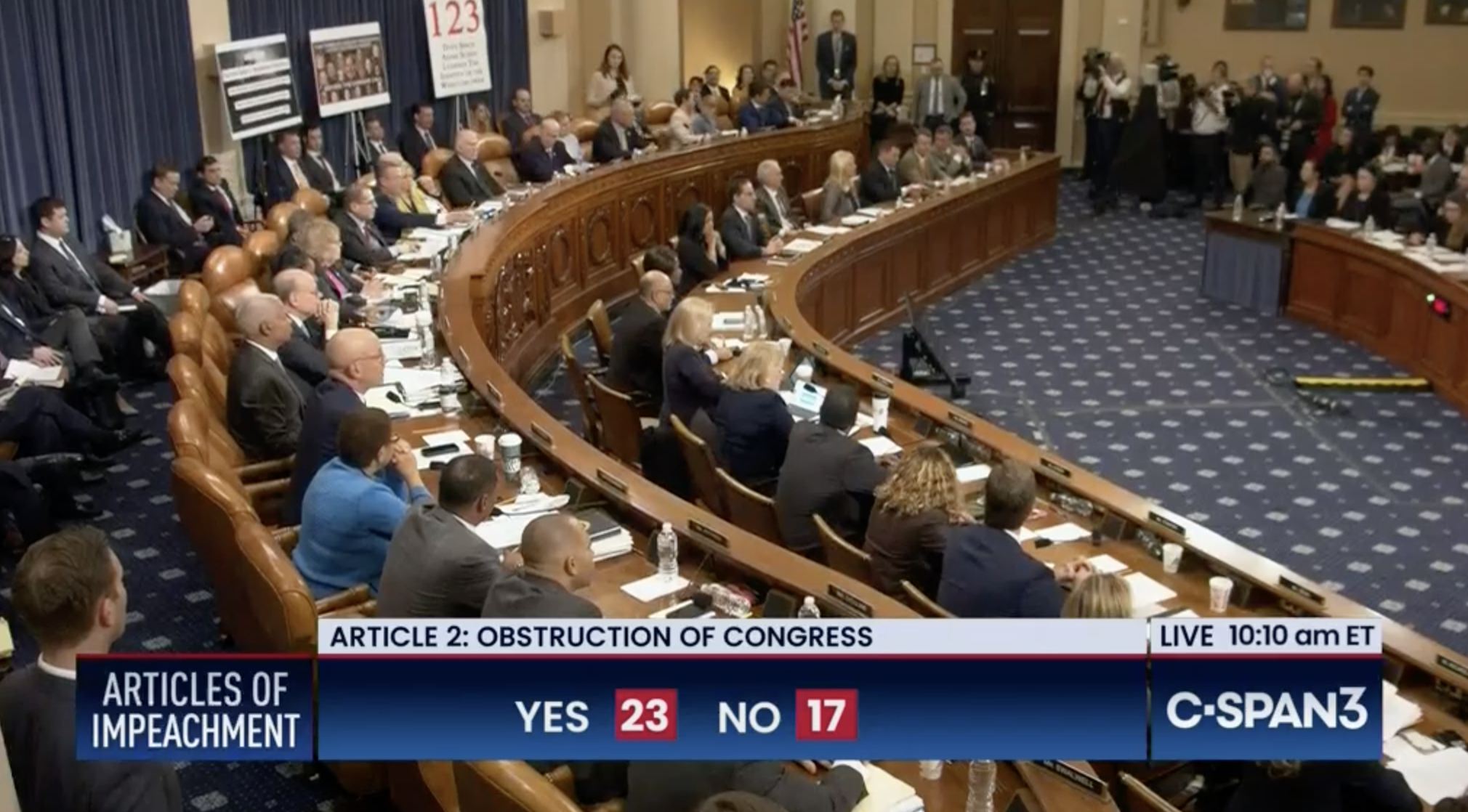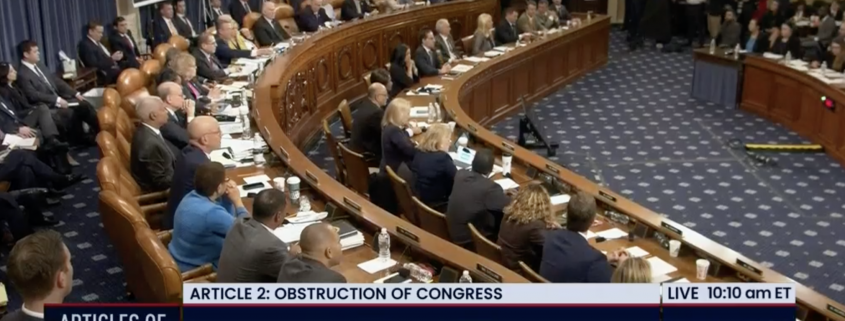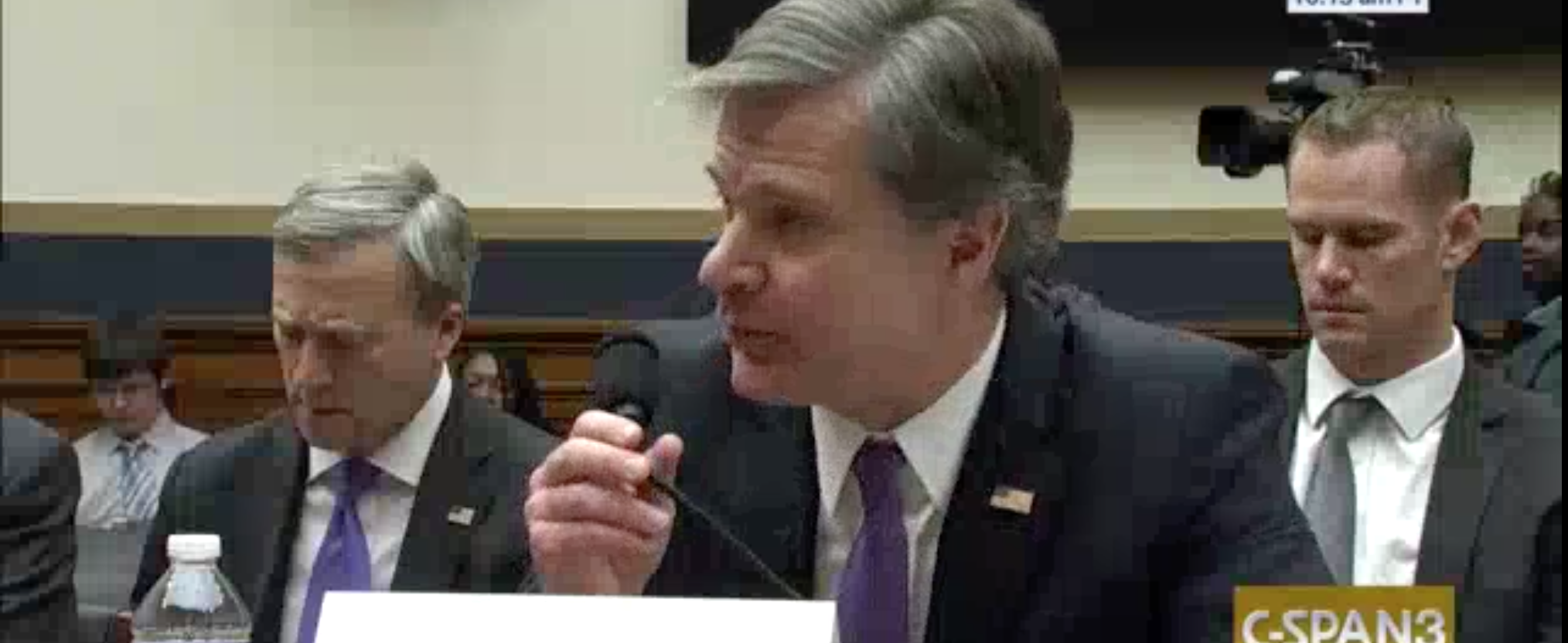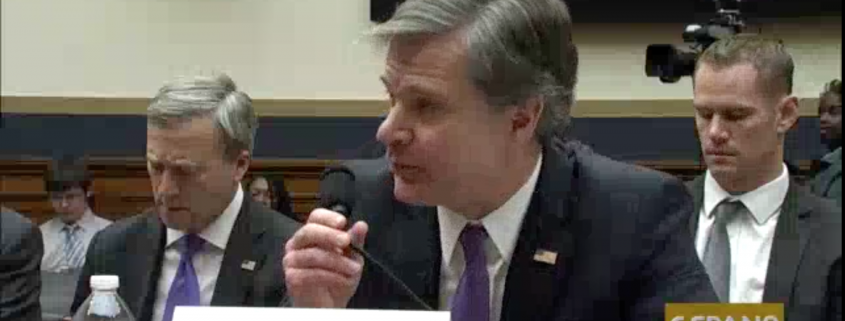In his first House Judiciary Committee oversight hearing today, FBI Director Christopher Wray responded to questions about FBI Agent Peter Strzok by explaining there was an ongoing Inspector General investigation into Strzok’s role in the investigation into Hillary’s treatment of classified information more times (at least 16) than he dodged answers in his confirmation hearing (11).
At that level, it was a typical HJC hearing, as each side spent more time pitching their partisan spin (with Democrats asking a string of questions Wray was unable to answer about Russia) rather than — with a few exceptions — conducting much oversight.
That said, I really appreciated two aspects of Wray’s testimony today. First, with the very notable exception of FISA matters (specifically, any FISA applications tied to Trump’s associates, and whether they derived in any way from the Steele dossier), Wray seemed genuinely willing to accept HJC’s mandate to conduct oversight.
As I’ve already noted, I get that HJC can be full of partisan hacks. But it is also the case that the Executive branch, particularly something as powerful as the FBI, must be subject to the oversight requests of Congress. And under both the Bush and Obama Administrations, FBI and DOJ largely treated their oversight committees with (sometimes deserved, but often undeserved) contempt. Even where Wray was bullshitting members of Congress, such as when he pretended that moving Strzok to human resources wasn’t a demotion, he at least appeared to treat their inquiries with respect.
Perhaps, if it is treated with respect it sometimes doesn’t deserve, HJC will come to become the committee FBI and DOJ need as an oversight body.
The other thing I appreciated — particularly in the wake of Jim Comey’s treatment of everything as a fight between “good guys” and “bad guys” — was Wray’s repeated invocation of the humanness of FBI and its officials. For example, in what must have been a rehearsed response to a question about the reputation of the FBI, Wray said, “Do we make mistakes? You bet we make mistakes. Just like everyone who is human makes mistakes,” before describing how the IG (which is currently investigating Strzok) provides the opportunity to “hold our folks accountable, if that’s appropriate.” Somewhat less convincingly, in response to a question from Cedric Richmond, who cleverly noted that the FBI Headquarters is still named after the architect of COINTELPRO, J Edgar Hoover, Wray again stressed the humanity of FBI. “It’s something we’re not proud of but it is also something we’ve learned from … We’re human, we make mistakes. We have things that we’ve done well. We’ve had things we done badly, and when we’ve done badly we try to learn from them.”
Given FBI’s intransigence on back door searches and Wray’s own evolving understanding of the problems caused by the designation Black Identity Extremist (not to mention what appears to be undeserved self-congratulation about how many — or rather few — open investigation into white supremacist terrorists the FBI has) I’m not convinced the FBI really has learned those lessons. It is still too white and too male of an organization to understand how much it polices some of the same things COINTELPRO did, and with even more intrusive tools.
But I am heartened that the FBI Director, perhaps largely because of the focus on Strzok, publicly recognized that FBI is not always the good guy, contrary to what Comey internalized and evangelized over and over. In discussions with Karen Bass about the BIE designation, too, it sounded like he was at least able to listen, even if he refused to withdraw the intelligence report that created the designation.
That said, Wray made several outright errors that need to be corrected.
The first two, both about Section 702, came in response to questions by Ted Poe (who was one of just a few people to raise Section 702, in spite of the fact that I’ve heard from numerous staffers they can’t get answers about key aspects of how 702 works). First, addressing Poe’s claim that back door searches are abusive, Wray claimed that courts that had considered the querying had found it to be consistent with the Fourth Amendment.
Every court, every court, to have looked at the way in which Section 702 is handled, including the querying, has concluded that it’s being done consistent with the Fourth Amendment.
As the EFF laid out, that’s not actually true. The Ninth Circuit punted on precisely the issue of back door searches.
When Wray mentions the Ninth Circuit, he is likely referencing a 2016 decision by the U.S. Court of Appeals for the Ninth Circuit. In the opinion for USA v. Mohamed Osman Mohamud, the appeals court ruled that, based on the very specific evidence of the lawsuit, data collected under Section 702 did not violate a U.S. person’s Fourth Amendment rights. But the judge explicitly wrote that this lawsuit did not involve some of the more “complex statutory and constitutional issues” potentially raised by Section 702.
Notably, the judge wrote that the Mohamud case did not involve “the retention and querying of incidentally collected communications.” That’s exactly what we mean when we talk about “backdoor searches.”
Wray is mischaracterizing the court’s opinion. He is wrong.
In addition, Wray claimed that,
The individuals that are incidentally collected — the US person information that is incidentally collected — are people that are in communication with foreigners who are the subject of foreign intelligence investigations, so like an ISIS recruiter, there’s a US person picked up, that person would have been in email contact, for example, with an ISIS recruiter.
While I’m not certain precisely what gets dumped into the FBI database that is queried, it is false to claim that every US person who has information collected would necessarily have been in communication with the target. That’s because PRISM providers are cloud storage providers and NSA gets anything a target stores and then some, and because people email very interesting stuff to each other all the time. That means there’s a whole bunch of other things that might implicate US persons swept up in the PRISM collection that gets shared, in raw form, with the FBI.
I wanted to point to an assumption virtually everyone has been making about PRISM collection and its suitability for back door searches that may not be valid. If you think about the hack-and-leak dumps in recent years, for example, often the most damaging, as well as the most ridiculous infringements on privacy, involve email attachments, such as the list of most Democratic members of Congress’ email many passwords for which were easily obtainable online, or phone conversations about routine housekeeping or illness. And that’s just attachments; most of the PRISM providers are actually cloud storage providers, in addition to being electronic communication providers, and from the very first requests to Yahoo there was mission creep of all the types of things the government might demand.
And while NSA and FBI aren’t supposed to keep stuff that doesn’t count as foreign intelligence or criminal information, it’s clear (from the WaPo report) that NSA, at least, does.
So as we talk about how inappropriate the upstream back door searches were and are because they can search on stuff that’s not foreign intelligence information, we should remember that the very same thing is likely true of back door searches of the fruits of searches on a person’s cloud storage account.
Plus, while the example of an ISIS recruiter makes for good show, the targets will also include people like Chinese scientists and Russian businessmen, among other things. There are completely innocent reasons — like science!!! — to speak to such targets. And yet if FBI does a back door search on Americans who’ve engaged in such innocent discussions it can and almost certainly has led to innocent people being targeted unfairly.
It bothers me that me — a dirty fucking hippie blogger, though admittedly one who has become (as a Congressional staffer introduced me as earlier this year) as expert on FISA as anyone outside of government — knows these details better than the FBI Director (who, after all, was involved in not providing defendants adequate notice of this stuff during its illegal go-around under Stellar Wind).
But Wray’s biggest error, on a different topic, came later. After first dodging Pramila Jayapal’s questions about whether Trump’s tweets have contributed to the spike of hate crimes this year by suggesting the data was untrustworthy (!!!), Director Wray than answered her question about the Muslim ban this way.
An awful lot of our terror investigations do also involve immigration violations, so there is a close nexus between immigration violations and counterterrorism investigations, and an awful lot of the terrorist investigations we have involve global jihadist rhetoric, which is disproportionately concentrated in certain countries.
One reason terror investigations involve immigration violations is because that’s an easy way to punish someone who hasn’t actually committed any crime (and given that most terrorist attacks are not recent immigrants, sort of beside the point).
But the notion that immigration from Muslim majority countries — like the six included in the current Muslim ban: Iran, Libya, Syria, Yemen, Somalia, and Chad — is dangerous because global jihadist rhetoric arises from those countries is the height of nonsense. That’s because the most effective recruiter of Americans for almost a decade was a man, Anwar al-Awlaki, who wrote much of his propaganda here or in the UK; while his rhetoric subsequently did get published from Yemen, he’s been dead for 6 years, with far less jihadist rhetoric in English from there. And while Syria, Somalia, and Libya do export hateful rhetoric, so did Iraq and does Saudi Arabia and Pakistan, two countries we haven’t banned. Iran certainly exports a great deal of anti-American rhetoric, but it is not recruiting terrorists here and most of its anti-American actions are legitimate state-based opposition derived from power relations, not religion. And Awlaki is by no means the only producer of anti-American rhetoric in majority Christian countries, including but not limited to the US and UK.
Ultimately, of course, Jayapal was talking about Trump’s Muslim ban, the one that bans elite Venezuelans and North Koreans along with weaker Muslim ones. And while he didn’t go as far as to say that Kim Jong-Un was spewing jihadist rhetoric, that’s the logic here.
But by implication, he was talking about Chad, which in spite of its cooperation on terrorism, got added to the list because Trump is incompetent. To suggest Chad is a propaganda threat and the US and UK are not is the height of folly.
But that’s what the FBI Director claimed today to avoid criticizing Trump’s bigotry.
Update: For some reason I was writing Cedric Richmond’s last name wrong all day today. I’ve corrected my use of “Johnson” instead of “Richmond” here. My apologies to him for my still uncorrected tweets.




